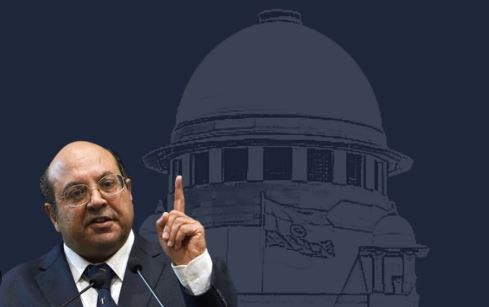New Delhi: After a series of attacks from the Centre on the Supreme Court’s Collegium system of appointments to higher judiciary, former Supreme Court judge Rohinton Fali Nariman took on Union Law Minister Kiren Rijiju at a public event Friday.
Nariman was a part of the collegium and retired in August 2021. He called Rijiju’s public remarks on the judiciary ‘diatribe’ and reminded him that it is his ‘bounden duty’ to accept the judgements of the court, whether ‘right or wrong’.
The former judge stated that the Centre’s “sitting on” names nominated by the Collegium was “deadly for democracy” and proposed giving the government 30 days to react, after which the suggestions would be automatically approved.
“We have heard a diatribe by the Law Minister of the day against this process. Let me assure the Law Minister that there are two basic Constitutional fundamentals that he must know. One fundamental is, unlike the USA, a minimum of five unelected judges are trusted with the interpretation of the Constitution Article 145(3). There is no equivalent in the USA. So a minimum of 5, of what we call the Constitution Bench, is trusted to interpret the Constitution. Once those five or more have interpreted the Constitution, it is your bounden duty as an authority under Article 144 to follow that judgement. Now, you may criticise it. As a citizen, I may criticise it, no problem. But never forget, unlike me … I am a citizen today, you are an authority and as an authority, you are bound by that judgement, right or wrong,” he said.
Notably, Vice President Jagdeep Dhankhar has also stated in favour of the Centre. He questioned the basic structure doctrine and indicated that the judiciary should know its limits.
Hinting at Vice President Jagdeep Dhankhar, Nariman stated that the basic structure is here to stay, and “thank god it has come to stay”.
Earlier, Dhankar told the striking down of the NJAC (National Judicial Appointments Commission) Act was a “severe compromise” of Parliamentary sovereignty.
Responding to Dhankar, Justice Nariman said, “From 1980 till date, this extremely important weapon in the hands of the judiciary has been used n number of times as one of the extremely important checks and balances to check an executive when it acts beyond the Constitution. And the last time it was used was probably to strike down the 99th amendment (of the Constitution) which was the National Judicial Appointments Commission Act.”
The retired judge sternly warned that we would “enter the abyss of a new dark age” if there were no independent and fearless judges.
The top court, according to Justice Nariman, should “tie all loose ends” in the recently “bandied-about” Memorandum of Procedure for judicial appointments by constituting a five-judge bench.
When he made these critical remarks, the former Supreme Court justice was delivering the sixth “Chief Justice MC Chagla Memorial Lecture” in Mumbai on “A Tale of Two Constitutions – India and the United States: the Long and Short of It All.”
Agencies
